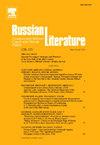同志交往:亚历山大·博格丹诺夫的生理集体主义与共同体重塑
IF 0.2
3区 文学
0 LITERATURE, SLAVIC
引用次数: 0
摘要
本文考察了苏联理论家亚历山大·波格丹诺夫(Aleksandr Bogdanov)的生理集体主义,它围绕着相互血液交换的思想建立起来,作为一种侵蚀个人之间边界的方法,以增加整个社会有机体的弹性;并将社区重新定义为生物体细胞之间的物质连接网络。COVID-19大流行增加了对恢复期血浆(CP)的兴趣。本文与Jane Bennett和Donna Haraway等理论家一起探讨了生理集体,作为康复血浆如何作为今天建立物质共同体的第一步的基础。本文章由计算机程序翻译,如有差异,请以英文原文为准。
Comradely Exchanges: Aleksandr Bogdanov’s Physiological Collectivism and Community Reimagined
This article examines Soviet theorist Aleksandr Bogdanov’s physiological collectivism, which builds around the idea of mutual blood exchange as a method of eroding borders between individuals to increase the resilience of the social organism as a whole; and reconceptualizes community as a network of material connections between the cells of said organism. The COVID-19 pandemic increased interest in convalescent plasma (CP). This article examines the physiological collective together with theorists like Jane Bennett and Donna Haraway as a basis for how convalescent plasma can function as a first step towards establishing material community today.
求助全文
通过发布文献求助,成功后即可免费获取论文全文。
去求助
来源期刊

RUSSIAN LITERATURE
LITERATURE, SLAVIC-
CiteScore
0.60
自引率
0.00%
发文量
50
期刊介绍:
Russian Literature combines issues devoted to special topics of Russian literature with contributions on related subjects in Croatian, Serbian, Czech, Slovak and Polish literatures. Moreover, several issues each year contain articles on heterogeneous subjects concerning Russian Literature. All methods and viewpoints are welcomed, provided they contribute something new, original or challenging to our understanding of Russian and other Slavic literatures. Russian Literature regularly publishes special issues devoted to: • the historical avant-garde in Russian literature and in the other Slavic literatures • the development of descriptive and theoretical poetics in Russian studies and in studies of other Slavic fields.
 求助内容:
求助内容: 应助结果提醒方式:
应助结果提醒方式:


